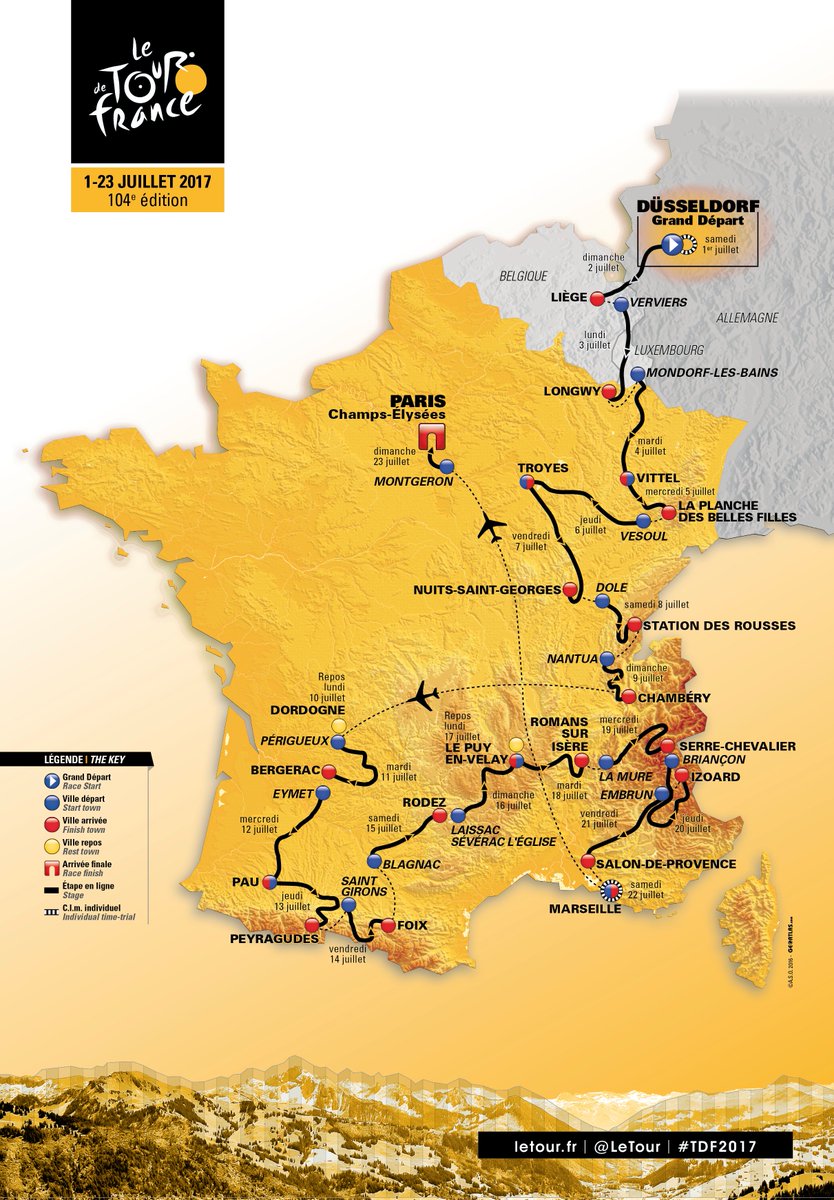The route for the 2017 Tour De France has been announced.
The route unveiled in Paris, sees new climbs many of which are steeper with all five mountainous regions in France being used and a time trial in Marseille after the Grand Depart in Dusseldorf Germany.

The Tour de France 2017 route
Stage one: Düsseldorf (DE) 13.8km ITT July 1st
Stage two: Dusseldorf (DE) – Liège (BE) 202km
Stage three: Verviers (BE) – Longwy 202km
Stage four: Mondorf-les-Bains (LU) – Vittel 203km
Stage five: Vittel – La Planche des Belles Filles (Summit finish) 160km
Stage six: Vesoul – Troyes 216km
Stage seven: Troyes – Nuits-Saint-Georges 214km
Stage eight: Dole – Station des Rousses (Summit finish) 187km
Stage nine: Nantua – Chambéry (Mountains) 181kms July 9th
Rest day in Perigueux
Stage 10: Périgueux – Bergerac 178km
Stage 11: Eymet – Pau 202kms July 12th
Stage 12: Pau – Peyragudes 214km
Stage 13: Saint-Girons – Foix 100km July 14
Stage 14: Blagnac – Rodez 181km
Stage 15: Laissac-Sévérac L’Eglise – Le Puy-en-Velay 189km
Rest day in Le Puy-en-Velay July 17th
Stage 16: Brioude – Romans-sur-Isère 165km
Stage 17: La Mure – Serre Chevalier (Summit finish) 183
Stage 18: Briançon – Col d’Izoard (Summit finish) 178kms
Stage 19: Embrun – Salon-de-Provence 220km
Stage 20: Marseille ITT 23km July 22nd
Stage 21: Montgeron – Paris 100km July 23rd.
Key points:
<!--[if !supportLists]-->- <!--[endif]-->30 years after the 1987 Grand Départ in Berlin, the Tour will start in the German city of Düsseldorf and later head to Belgium and Luxembourg.
<!--[if !supportLists]-->- <!--[endif]-->The course of the 2017 Tour de France will feature France's five mountain ranges. Tour favourites will go head-to-head on steep gradients. The Izoard will host the last summit finish.
<!--[if !supportLists]-->- <!--[endif]-->Exceptional locations such as Marseille's Stade Vélodrome and the Grand Palais in Paris will roll out the red carpet for the peloton.
The course of the 104th Tour de France (1–23 July, 2017), which was unveiled before an audience of almost 4,000 people at the Palais des Congrès in Paris, stands out for its atypical mountain stages. Although there will be fewer climbs than usual, their steeper gradients will separate the men from the boys. From the time trial in Düsseldorf to the one in Marseille on the eve of the finish, there are plenty of hat-tips to tradition. Inspiration for the brave.
2016 winner Chris Froome on stage.
Vosges, Jura, Pyrenees, Central Massif and Alps —the 2017 Tour de France will tackle France's five major mountain ranges in this order. 1992 was the last time this mountainous Grand Slam was in the race. The new features it is rolling out this time around will raise eyebrows: the queen stage will tackle the Jura mountains between Nantua and Chambéry (Col de la Biche, Grand Colombier and Mont du Chat, for a total altitude gain of 4,600 m !); pretenders to the crown will go head-to-head in the Pyrenees in a 100 km stage from Saint-Girons to Foix; sections approaching a 20% gradient will provide fertile ground for attacks on La Planche des Belles Filles and Peyragudes; and the race will be decided in a spectacular climax on the Izoard, a fabled climb which will set the scene for the concluding mountain showdown in its first stage finish ever.
Mountain goats, however, will not have all the fun, and they will have to fight for the yellow jersey in a time trial on the Mediterranean coast, with the finish line right in Marseille's Vélodrome stadium. The last time a stage finished in a football ground was in Bordeaux's Parc Lescure in 1979. Less than 24 hours later, the peloton will be in Montgeron — start of the 1903 Tour — for the final stage, which will see them ride indoors in the prestigious Grand Palais. The Champs-Élysées will see a fast-man apotheosis to cap a series of sprints which will start in Liège and probably continue in Vittel, Troyes, Nuits-Saint-Georges and Romans-sur-Isère. Time to settle old scores…
Pictures copyright of CNS Sport. Credit CNS/ZC